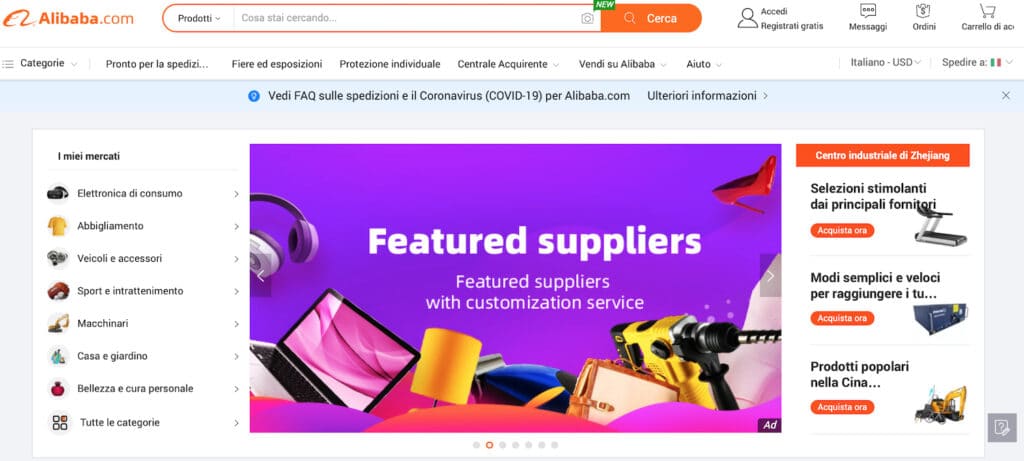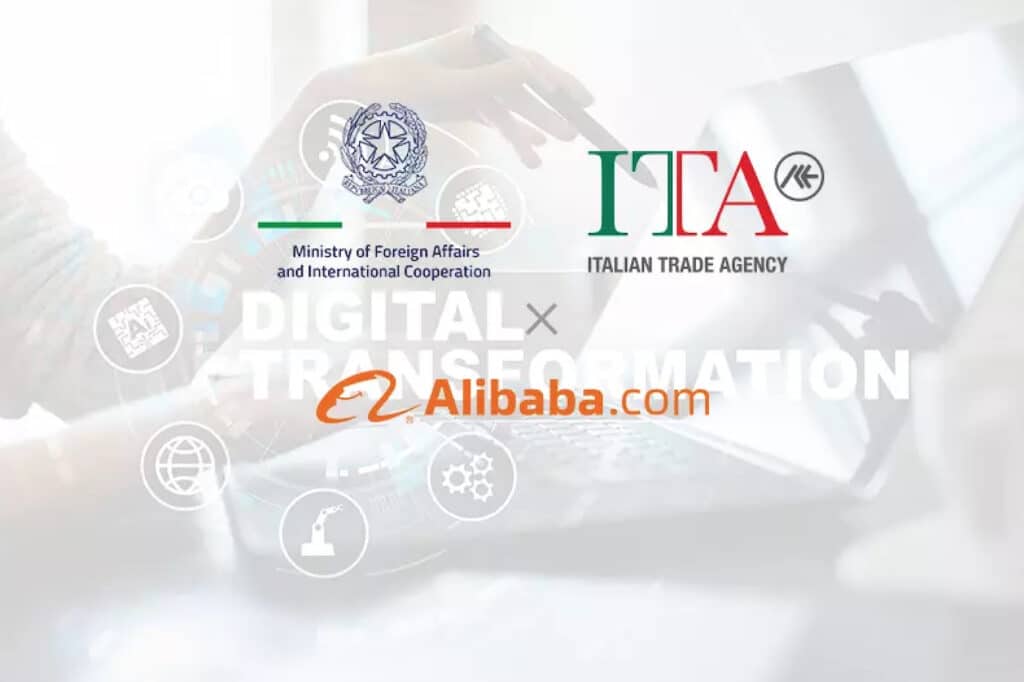We got to speak with Luca Curtarelli, responsible for Italy and Spain of Alibaba.com, a fundamental tool to support the export of small and medium-sized enterprises. During our chat, Luca Curtarelli highlighted the growing interest of Italian companies in this platform, confirmed by extremely positive numbers, especially in the last two years.
Can you tell us a little about Alibaba and specifically Alibaba.com?
Alibaba as a group was born in 1999 with Alibaba.com, the first startup created by Jack Ma along with 18 other co-founders in an iconic Hangzhou apartment. Today it is a global technology company, which is the largest set of mobile and online commerce marketplaces in the world, with 1.2 trillion turnover achieved in 2021. We are talking about an ecosystem of digital and physical businesses ranging from retail to the marketplace, also touching payment, cloud and logistics solutions. Alibaba.com is the group’s first startup, with its B2B anywhere mission accompanying the entire ecosystem. Notably, it is the largest business-to-business digital commerce platform in the world.
Our mission in Italy is to support companies in their digitalization and internationalization. The same principle with which the company was born 22 years ago, with a view to helping the small Chinese companies of the time, historically very efficient but not very skilled in offering their products to the West. Today Alibaba.com helps companies that come from 190 countries do business. We are leaders in this sector, and we have 26 million customers on the platform, over 150 million registered users and hundreds of thousands of exhibiting companies. For comparison, the Milan Expo had around 22 million visitors in one year, including tourists.
Through Alibaba.com, about 340,000 requests for quotes or information go through every day. A mass of business opportunities that are difficult to repeat in offline contexts. Thanks to these numbers, we are partners of both private entities and institutions, such as the institute for external trade, within the Ministry of Foreign Affairs.
What are Alibaba.com’s projects for Italy?

In Italy we have 4 different business units active: in addition to Alibaba.com, there are Tmall, dedicated to Chinese customers in a B2C logic, which with 920 million consumers is the main gateway to China; AliExpress, B2C version to Europe and in particular to France, Spain and Italy, which is also the main e-commerce in Russia; Alipay, a platform dedicated to payments and more. Italy is the first country in which a local office was created, with the aim of helping Italian brands to enter the Chinese market, in this case especially with Tmall. In 2015, this mission was amplified and Italy was the first country in which a local team was created, with the aim of helping Italian companies to export all over the world through Alibaba.com.
To date, Italy is the only European nation where there is a local team. It is interesting to note how a platform born and raised in China is becoming more and more tricolor. Italy was chosen for a few reasons. The first is the business opportunity: there is a strong symmetry between what our buyers are looking for and what is typical of Made in Italy production. The top 5 categories by potential on Alibaba.com are in fact food, clothing, furniture, machinery and cosmetics.
Also, buyers on Alibaba.com are evolving, not just looking for Chinese productions but looking for a global chain instead. However, there is no longer any need to travel the world in search of supplies, you can do it directly from our desks. Within this evolution, there is more and more attention to Made in Italy. Our mission is to give small businesses the knowledge of this opportunity and provide them with all the tools to benefit from it.
In Alibaba.com, there is a pavilion entirely dedicated to Made in Italy, within which there are several sub-pavilions, such as that of Bologna Fiere, for which we have created the Sana and the Marca online on our platform. We also have a number of partners in the area, which we have educated both in the story of what Alibaba.com is, and in supporting companies to be successful after joining our membership. Another advantage for companies on our platform is the possibility to participate in several online fairs that we organize annually. Last year there were 28, and they collected about 8.2 million buyers.
Another element is education. In the field of digital, there is no longer the indolence of a few years ago, but it is above all a question of speed in seizing the opportunity. Our role is to explain the opportunity and help companies, on an educational level, to make the most of their presence at this great fair.
Over the past two years, we’ve had 193% growth in businesses on the platform. This number is a big responsibility for us, as we need to help companies grow further. Thanks to our efforts, the demand for Italianness has grown by 250%, therefore with an even faster rate than the offer. This is leading to a virtuous cycle, with more and more companies entering Alibaba.com and our platform becoming more authoritative towards buyers. Within 3 years, we want to reach the quota of 10,000 digitized Italian companies thanks to Alibaba.com, with the possibility of being profitable. Physical touchpoints, such as trade shows, remain extremely valuable, but over time they have been joined by multiple digital touchpoints. Now, 80% of the companies that buy do so online. Alibaba.com is the premier digital touchpoint for shoppers, accessible without traveling around the world.
In the coming years, we will continue to invest in our partners and enrich our platform with technological contents, starting from what we have already done well, such as a real time translation system. Already now, our statistics allow us to know a series of extraordinary information, such as where buyers come from, what type of product they are interested in, at what time of the year or what they are looking for when looking for competitors. Information that can be useful for the company to rethink its online and offline export strategy.
Can you tell us a little about your online trade shows and their potential for the future?
Online fairs were a very interesting initiative at a particular time, when it was impossible to organize physical fairs. We made our first online fair at home on 11 May 2020, in full pandemic and in full lockdown. It was a global success, and since then we have held 28 different fairs, divided by sector. For example, we organized the machinery fair, the clothing fair and the sports fair, understanding what our users were looking for. We have also carried out hybrid experiments, creating for example a virtual version of Cosmoprof: an initiative developed by a local team with local partners, developed for the benefit of the entire global community on our platform.
We noticed that on average transactions during online trade shows were 30% higher than average deals made through Alibaba.com without the presence of the digital fair online event. A success that is also the result of our initiatives, aimed at replicating the physical experience. Human contact can never be completely supplanted by a digital experience, but we have tried to create a context that allows for trusting relationships, with matchmaking solutions, virtual rooms, VIP lounges or live streaming. Our sellers also had the opportunity to do shoppertainment activities, telling their new product or their story live, interacting with buyers. Last year, thanks to Alibaba.com 13,000 businesses did live stream for the first time.
The online fair will never be an exclusive solution compared to the physical fair. In fact, we were the first to create agreements for hybrid solutions. The challenge is to find solutions that allow companies greater profits than the exclusively physical form and the exclusively online one. In this sense, we have ongoing partnerships with physical fairs, in order to help them open up to digital and continue to represent what they represent in a B2B world. Thanks to us, they don’t have to start from scratch.

How has the pandemic impacted on Alibaba.com’s business?
Since the first months of the lockdown we have noticed the sprint of B2B towards digitalization. In our role, we represented a solution, at a time when traditional solutions had suddenly failed. With the start of the lockdown in China, there has been a 38% increase in Chinese sellers with at least one sale on the platform and a 49% increase in customers who have made at least one purchase through Alibaba.com. In Italy, there was a growth of 55% of companies active on the marketplaces in the sales phase, while 85% of customers took action to shop online, with a growth of 18% compared to 2019. Supply and demand they are moving to digital, and we are the first step in that direction.
Can you tell us about the potential of shoppertainment?
Shoppertainment was born in Asia, thanks above all to influencers and KOL, and is now moving into the B2B world. For example, on Taobao, through live streaming some families in the rural area were able to connect with those who lived in the city, telling about their product and also the magic of their life, thus continuing to do business. We have adapted dynamics like these in a B2B context, especially with interactive live streams. In Italy, the Branca brothers hired a barman connected by a local in Sardinia, who told in streaming how to make a cocktail through Branca products, with excellent feedback from customers.
What are the steps and investments a company must make to enter Alibaba.com?
Alibaba.com has a high accessibility. We are talking about an investment of a few thousand euros for a minimum stay of 12 months, although we suggest at least 24. The budget does not necessarily determine success: even small businesses can become medium thanks to …















Leave a Reply
View Comments